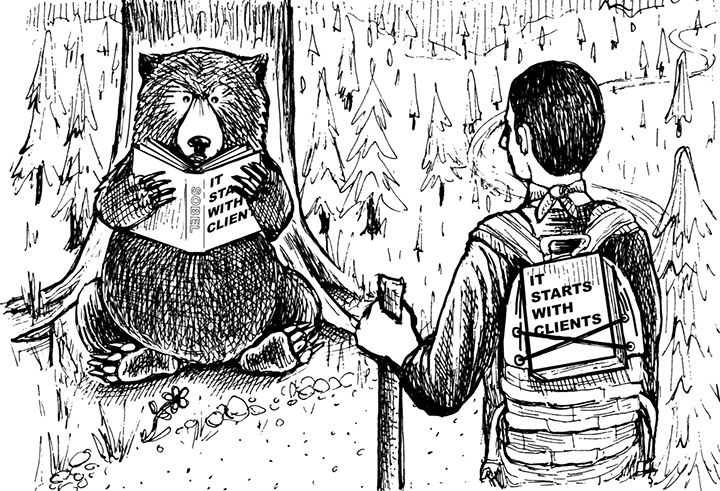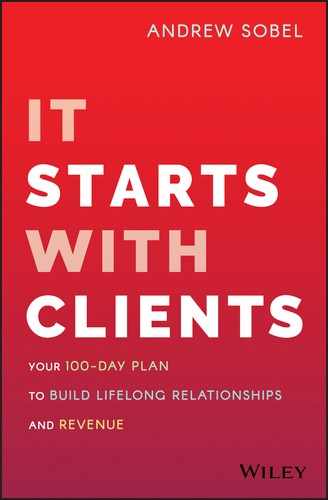Day 100
Keep Your Clients for Life

The beauty of staying in touch
A few years ago, I received a phone call from an old client of mine. It had been five years since we had worked together. We had periodically been in touch, but there was never a compelling reason to reengage. The reason for the call? He had just read my newsletter, Client Loyalty, and wanted to discuss a project. My article that month happened to be about an urgent challenge his firm faced.
It turned out that during those five years, he had always read the subject lines for my newsletter emails. Once in a while, when one piqued his interest, he opened the email and read it. Now, finally, the stars had aligned. My chosen topic that month, and the value I provided in the article, matched an important need of his.
I used to be preoccupied with the sad fact that for years, some clients seemed to pay no attention to my newsletter. But after many incidents like this one, where someone would contact me after a long period of silence, I realized something very powerful was at work.
I call it the “radar screen theory of selling.” You need to stay on your clients’ radar screen. You have to be top of mind when they have a need in your area of expertise. Or, as one of my clients once told me, “You have to be there when the dam breaks.”
So stay connected, with both current and past clients, in meaningful ways. Keep your ideas—your value—in front of them on a regular basis. It's essential if you want to keep clients for the long term.
Treating old clients like brand new ones
When I interview senior executives about the times when they have switched providers, they consistently say things like this about the incumbent:
- “They got complacent and took our business for granted.”
- “They stopped trying hard. Lately, they haven't been very responsive.”
- “Some of the other firms calling on us were adding more value—and we aren't even their client!”
- “There were little slipups. And they kept changing out members of the team.”
Complacency, which sums up the gist of what these buyers are saying, is the enemy of the successful professional. I have seen it time and time again. If a client relationship isn't improving, it is usually getting worse—except we often don't see the deterioration. While there are major differences between the dynamics of professional versus personal relationships, the destructive power of complacency is a notable similarity. Think about it: marriages and partnerships often break up when one or both parties stop trying. When they stop caring as much as they used to. When they take the other person for granted.
While marriage is a complex topic, I firmly believe that one of the keys to success is treating your spouse or partner as a newlywed. When you're courting someone you think of him or her often. You bring them special presents. You tell them how important they are. You want to look your best for them. You are patient and tolerant. But fast-forward 10 or 20 years and those caring habits can easily fade, replaced by an immersion in daily routines and self-focus.
In short, go to the 100th meeting with your client with the same enthusiasm, new ideas, attention, and desire to make an impact that you displayed in your first conversation. If you do, you'll dramatically increase your odds of retaining them. If you don't act like this, why would they stick with you?
Get rid of “me”
A “me-centric” attitude doesn't help attract clients into long-term relationships with you. It does enable some people to succeed in the short term, but it's a shallow way to live. There's a better and more powerful approach: “you/we.”
Through both my research and my personal experience, I've found there are six personal qualities that, in particular, help fuel trusted client relationships. They enable you to maintain your center of gravity through the inevitable ups and downs of working with clients. They are:
- Curiosity. Curiosity drives a thirst to learn about knowledge and other people. It motivates you to ask thoughtful questions. Without curiosity, you won't empathize effectively. A lack of interest in others makes you look self-satisfied or even arrogant.
- Listening. Good listening is a rare skill. Good listeners truly hear what their clients are saying. They ask questions and then listen, affirm, synthesize, and act on what they've learned.
- Generosity. When you're generous, you demonstrate a readiness to give more than is expected. It's an attractive, winsome quality that increases trust and likability. If trust is the universal lubricant of relationships, generosity is what fuels them.
- Patience. The world around us rarely adheres to the schedules we demand. Patience will save you a lot of aggravation and anger, because nothing ever happens as quickly and neatly as we'd like. Think of yourself as a gardener as you work with clients. You need an abundance of patience to commit the time and effort required to grow healthy flowers and vegetables. Two of my best clients today, for example, took a year and three years, respectively, to engage me after our first conversation!
- Humble Confidence. Confidence tempered with a good dose of humility is highly attractive to clients. Self-importance, in contrast, is terribly distasteful. The author C. S. Lewis described it this way, referring to what it's like to meet a humble person: “Probably all you will think about him is that he seemed a cheerful, intelligent chap who took a real interest in what you said to him …. He will not be thinking about humility: he will not be thinking about himself at all.”
- Caring. Clients want to know whether you care about them and about their business. When you show real concern for their problems, their aspirations, and what they are going through, it puts the relationship on another plane. Without caring, your expertise and solutions are hollow. By themselves, they qualify you for a short-term transaction, but not an enduring relationship.
Many of the ideas in this book are about things you do with and for clients. But if your core isn't solid, those strategies are a house of cards. Your expertise can only take you so far without curiosity, generosity, patience, deep listening, measured self-confidence, and authentic caring.
How are you doing on these attributes?
The final secret
While researching my first book, Clients for Life, I interviewed a large selection of CEOs about their most trusted advisors and service providers. One of these executives was Chuck Lillis, who at the time was the CEO of the cable company MediaOne, which was later sold to ATT for $64 billion.
When I asked Chuck about the qualities he looked for in an external advisor, he said something quite powerful: “I wish all my advisors were independently wealthy.”
“Can you say more about that?” I responded.
“Then,” he clarified, “I would know that the individual was giving me advice that was completely objective and unbiased by any financial considerations. They would always be candid and have no fear of telling me what I need to hear rather than what they think I want to hear. They would have my best interests in mind at all times.”
You may not (yet!) be independently wealthy. But even if you still have to work for a living, you can possess the mindset of independent wealth. How so? By acting as if you are independently wealthy. If you do, you'll behave in ways that endear clients to you. You'll push back or even say “no” to a client idea or proposal with no concern about the financial consequences. You'll willingly invest in the relationship and take time to learn about your client's business. Professionally, you might be open to try more new things, since you wouldn't be afraid of failure. I also think you would be more inclined to insist on framing the client's problem correctly and charging appropriate fees for your work.
But how do you actually embody this mindset? You can do it by exemplifying three behaviors when you are with your clients:
First, walk in as a peer. Treat your client like a colleague or friend, not as a superior. Be polite and courteous, but not deferential or fawning. The first sale is always to yourself. If you don't believe you have something valuable to share with others, they won't believe it either.
Second, ignore the clock. In a world of unlimited distractions and preoccupations, be totally and completely immersed in the conversation. Listen at the highest level of concentration possible. Don't check your smartphone, think about your next appointment, or worry about that troublesome email you just spied from your boss or another client. For those 30 or 60 minutes, make your client feel like he or she is the only person in your world.
Finally, exude enthusiasm. If you're not passionate about your work and thrilled about what you can do for your clients, why would they be? Enthusiasm is an underrated quality. It comes from the Greek enthousiasmos, and means a feeling of excitement or fervor. Originally it was used to describe religious passion. In a similar vein, you should demonstrate a zeal for your work. If you're excited about your topic, it will ignite the other person's interest as well. You'll raise the energy level in the room.
* * *
You've now got solutions for overcoming many of your biggest client development challenges—the 14 weeks of this book. Feel free to contact me at [email protected] with questions, comments, or client success stories—I'd love to hear from you. And, if you want a set of additional resources to help you apply these strategies, you can download my Client Growth Guide for free at www.andrewsobel.com/growth-guide.
Here's to your success with clients!
